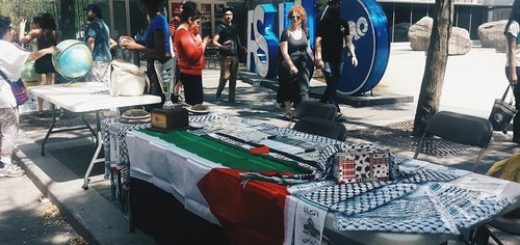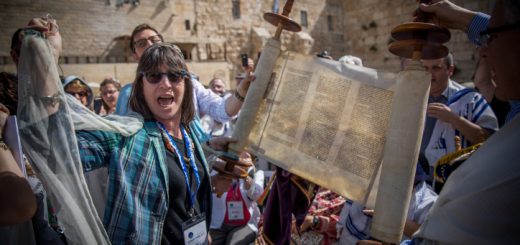Max Steinberg, zt”l, as Rorschach Test

The death of lone soldier Max Steinberg in combat in Gaza served as a Rorschach Test for Jews around the world. In Israel, 30,000 Jews, across the spectrum of Israeli society, took time off to go to Mt. Herzl for his levaya to express their admiration and gratitude to a young man who came to Israel to risk his life to protect theirs.
In the opposite corner, Slate editor Allison Benedikt could barely wait until the last shoveful of dirt had been placed on Max’s grave before portraying his as a dupe of Birthright, which spends “hundreds of millions of dollars to convince young Jews that they are deeply connected to a country that desperately needs their support.” Benedikt’s lament over Max’s death picks up where a 2011 reminiscence of her misspent Zionist youth left off. There she describes how her non-Jewish boyfriend, now husband, opened her eyes to evils of modern Israel.
Benedikt is emblematic of disappearing American Jewry. In her adult persona, she can no longer imagine any natural affinity between American Jews and the state of Israel, even though the latter is the only majority Jewish nation and home to the majority, or soon to be majority, of the world’s Jews. She denies that there could be any deep connection between an American Jew and Israel – only an ersatz sentimentality.
Max, in her reading, was likely “especially lost or especially susceptible,” for what else could explain his decision to serve in the IDF. The idea that “picking on an IDF uniform and grabbing a gun” might be a way of doing some good in the world is nothing short of laughable to her. Max, according to Benedikt, might as well have been the dim high school student in The Prime of Miss Jean Brodie who inspired by her teacher’s passionate rhetoric goes off to fight in Spain and ends up dying on the Republican side, even Miss Brodie supports the Loyalists.
How much has changed over sixty years. In 1948, hundreds of Jewish men, many of whom had fought in World War II, came to Israel to fight in the War of Independence. U.S. Col. Mickey Marcus became the first general in Israel’s fledgling army and played a major role lifting the siege of Jerusalem. Foreign pilots formed the core of Israel’s original air force, and played a major role in stopping the Egyptian advance up the coast towards Tel Aviv. True, the decision to volunteer was brave then as now, but few American Jews would have considered it strange or unnatural for a young Jew to be willing to fight for Jewish independence.
For Benedikt, Max’s death was a waste. Fortunately, that is not how his parents, who had never before been to Israel, viewed it. In his eulogy for his son, Stuart Steinberg was emphatic on this point: “We want to answer the question on the minds of many people. Do you have any regrets that Max enlisted in the IDF as a lone soldier? My answer is an unequivocal, ‘No!'”
His mother Evie admitted that in his upper-middle class southern California upbringing, Max had “never found his purpose.” But he did in Israel. “As parents, we are filled with joy and pride for the man that our son became and the life he lived. . . . There is no doubt in our minds that our son was put on this earth for a mission.”
Had he stayed in Los Angeles, Max would likely have lived to a much older age (though there are no guarantees). But how likely is it that he would have died with a clear sense of having fulfilled a mission? How likely that he would have been zocheh to arichus yamim – days filled with life – and not just arichus shanim. Max, pace Ms. Benedikt, needed Israel every bit as much as Israel needed him.
BENEDIKT NOTWITHSTANDING, MAX STEINBERG was no dupe. He knew exactly the dangers involved. After all, he made the decision to come to Israel at the grave of another “lone soldier” killed in battle.
I can well understand Max’s decision, though I am in awe of it. I can still remember tooling around in my father’s convertible, in our comfortable Chicago suburb, just after the Six-Day War, and wondering what I was doing with my life when Jewish boys just a few years older than I were dying.
On July 4, 1976, that question returned in force. I was in Jerusalem that summer, just after finishing law school. While the dominant mood the morning of the Entebbe rescue was celebration of the miraculous rescue, I could not stop thinking about my namesake Yonatan Netanyahu. Until then, I would probably have justified my reluctance to do what Max Steinberg did by reference to my bright future and all then great contributions to humanity that I would doubtless make one day. But Yonatan Netanyahu was educated at all the same elite schools, and his future was even brighter. He was already viewed as a future chief of staff, and perhaps prime minister. Yet he did not let that hold him back from being the first through the airport doors at Entebbe, as his men stormed the terrorists. I was out of excuses.
The latest war in Gaza has, I would imagine, many of us thinking constantly about the courage, motivation, and faith (yes faith) of the Jewish soldiers fighting there. To go into battle means to give up to a large extent control over one’s life. Yes, there are mistakes that can increase the danger. But no matter how well-trained, how skilled one is, if a IED blows up under your unarmored troop carrier, or a sniper hidden from view puts you in his sites, all the skill and bravery in the world won’t help.
Gaza is a particular death trap. David Horowitz of The Times of Israel describes Hamas’s years of preparation: “It has booby-trapped buildings, deployed snipers, primed teenagers with suicide-bomber belts, planted bombs, and most relevantly, when it knows where the soldiers are headed: to the tunnel openings Hamas had dug and in which its gunmen are hiding.” That the casualties are not higher is evidence of the courage and training of the soldiers and the Hashgacha Pratis watching over them.
IN THE HEAT of war, there is too little time to contemplate the full magnitude of the loss represented by the over fifty Jews killed so far. But hints of the loss to the Jewish people are all around. Last week, I was listening to the funeral of Uri Heiman of Efrat, the son of friends of friends. His fiancé related, between sobs, how the last time they were together they made a siyum on Mesilas Yesharim.
At another recent levaya, the mother of the fallen soldier read a letter he had left behind in his desk drawer in the event that he did not return. Listen to his final message: “Mom, if you are listening to me right now, you know that I have not come back from battle. But know in your heart that you raised a son proud to be a Jew and willing to die as a Jew (emphasis added) . . . . Be proud of me. I know it must hurt, but I will always be around you. I will always look after you and after Danielle and Benny. I love our country, a love you instilled in me. So don’t cry Mom. Look at what you and your parents accomplished since 1948. Look at the dream I was able to live. And how proud I was to join the IDF and defend our people . . . . “
There were an almost endless number of reasons for rejecting the ceasefire proposal put forward by Secretary of State Kerry. But perhaps the most important of all is that by denying Israel the chance to finish the destruction of the offensive tunnels from Gaza into Israel – tunnels that were to be used for a mass terror attack on Rosh Hashanah – and substantially degrade Hamas’s fighting capabilities the ceasefire would have turned to vain the sacrifices made by the soldiers killed and wounded so far. And in President Lincoln’s immortal words, a government has no more solemn duty than to “resolve that these dead shall not have died in vain.”




This was a nice post, particularly the moving posthumous letter, but it would have been better if the references to the Slate editor had been left out. Honestly, I find attacks on other columnists or papers to be so tedious. I’m really not interested in reading what my opponents think – we’re never going to convince everybody, so its a waste of time to snipe at their opinions. Winners don’t worry about what others think, and you become a winner by acting like a winner. Besides, news and media are so fragmented today, no single column (editorial, show, op-ed, etc.) matters more than another. Everyone’s got a blog.
That aside, nice piece. The soldiers were heroic. יהי זכרם ברוך עדי עד.
Is is important to note that yesterday, a special charter flight of olim landed in Israel, with over 300 olim, among whom were over 100 who were coming to enlist in the IDF. The recent war and the painful casualties did NOT deter these people from coming. When a Jew gets turned on to his or her tradition and the wonders of the revived Jewish state in Israel, there is NOTHING that can stop them! Max would have been proud and is a fine example for everyone.
Our son Yoni was also a Lone Soldier,someone who went to Israel and volunteered for the IDF. Even though his service ended, he was called up for the current war. Service in th eIDF is a way for some diaspora youth to identify with their Jewishess. Max Steinberg may not have come from an affiliated home but his “pintele yid” was aakened and he volunteered.
For those who do not like current Israeli policty and whose tenuous connrection to Jewish peoplehood or religiion is too weak to overcome the negative image of the media, all I can say is that is why we need Birthright. There are other programs like Jewish Women’s Renaissance Project that bring diaspora Jews to Israel.
I don’t know if this will go over with Cross-Currents but while we have gained a lot in the religion angle lately, the tribal/familial identity has weakened in thisopen society. In the olden days, even the non observant were very ethnically Jewish. What is ethnicalaly Jewish in 2014, I am not sure. That is why they have to go to Israel. It adds that dimension and is important.